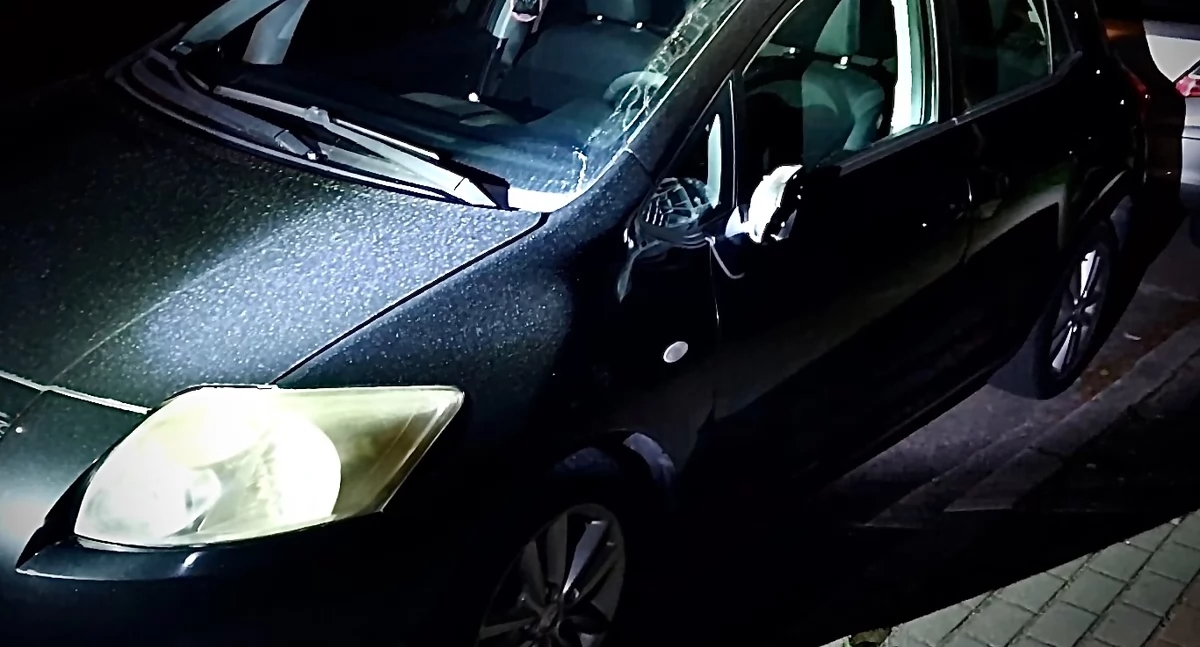Description of the facts
the indictment, together with the application under Article 335(2) of the NCP, J.D. The defendants were accused of directing the public road by a passenger car in an intoxicated state, i.e. of acting in accordance with Article 178a(1) of the KK, and of not complying with the issued order utilizing light and sound signals by a traffic control officer authorised to control the traffic of a police officer, i.e. of acting in accordance with Article 178b of the KK.
By judgement of 27.1.2021, II K 785/20, the territory Court of H. acknowledged J.D. for the guilty performance of the alleged acts and for the accused he ordered a full fine of 130 regular units, setting the regular rate of PLN 15.
The territory Court of Z., after examining the prosecutor's appeal against the penalty, by a judgement of 7.5.2021, II Ka 184/21, the full punishment in the form of a fine was set at 130 regular units, setting the amount of 1 regular rate at PLN 15.
The cassation was brought by the lawyer General, who challenged the decision in favour of the suspect J.D., alleged gross and having a crucial influence on the content of the judgement a breach of the procedural law, namely Article 433(1) of the NCP in Article 440 of the NCP, as well as substantive law in the form of Article 43a(2) of the NCC.
In so doing, the applicant requested the annulment of the judgement and the dismissal of the proceedings against J.D.
The ultimate Court, after examining the cassation brought by the lawyer General in favour, overturned the judgments of the courts of both instances in the part concerning the conviction J.D. for having committed an offence pursuant to Article 178b of the CCC and the decisions related thereto, and considering that the act attributed to it exhausts the marks of the offence pursuant to Article 92(2) of the CCC, pursuant to Article 5(1)(4) of the CCC in accordance with Article 45(1) of the CCC has terminated the proceedings.
Reasons for SN
According to the ultimate Court, the cassation of the lawyer General – as to the substance of the deficiencies raised in it – is, of course, justified, and, in accordance with the disposition of Article 535(5) of the NCPs, was subject to consideration at a sitting without the participation of the parties.
It is correct for the applicant that the characteristics of the organization to the offence referred to in Article 178b of the KK in question include, inter alia, the fact that the individual entitled to road traffic control who issued the order to halt a motor vehicle was ‘moved by a vehicle or was on board a ship or aircraft’ (see the ultimate Court judgement of 22.10.2024, III KK 294/24, Legalis). In turn, Article 413(2)(1) of the NCP requires a precise definition of the alleged act and its legal competence. It is so essential to indicate a set of characteristics of the offence in question which have been fulfilled by the established conduct of the accused.
In the present case, as is apparent from the judgement of the court a quo – read in the light of the judgement of the appeal court – J.D. A violation of Article 178b of the KK was attributed, inter alia, to the fact that, while driving a passenger car, cited: "He did not comply with the issued command to usage light and sound signals by an authorised traffic control officer of the territory Police Command in H. ordering the halt of the vehicle and continued to drive in land traffic" (original writing – note of the SN). Apart from the linguistic correctness of the description of the action which was presented in the preliminary part of the judgement of the court a quo (not correct edition, among others, due to deficiency of preposition with before a word use and making an inappropriate variation of that word), it must be stated that it is not apparent from specified a description of the act that a police officer, issuing a detention order to the accused, was travelling in a vehicle or was on a boat or aircraft. This description of the act does not so reflect the set of marks of the offence referred to in Article 178b of the KK, which besides prejudges the gross flaw of the conviction J.D. in that area. erstwhile again, Article 413(2)(1) of the NCP requires that the conviction should contain a precise definition of the alleged act and its legal qualification. Of course, regarding the descriptive nature of the peculiar prohibited act, the procedural law does not require the usage of code terms, so the criminal court may usage expressions that correspond to those utilized by the legislature.
In many judgments, the ultimate Court has consistently pointed out that the absence of any sign of a crime in the description of the act results in the impossibility of attributing criminal liability for that act (see, inter alia, ultimate Court judgments of 22.3.2012, IV KK 375/11, Legalis; 29.5.2012, III KK 87/12, Legalis; 6.4.2017, V KK 372/16, Legalis; order of the ultimate Court of 6.2.2019, II KK 179/18, Legalis).
Court meriti the judgement in question has been given under Article 335(2) of the NCP, and so the court was required to review the application not only from a formal point of view but besides from a view of compliance with the provisions of applicable substantive law (see ultimate Court judgement of 16.2.2022, V KK 469/21, Legalis). In the present case, as is apparent from the Court’s judgement meriti as regards the deterioration of the characteristics of the offence pursuant to Article 178b of the KK, the body is obliged to do so. a quo did not observe what he grossly violated the disposition of Article 343(7) of the NCP in the aforementioned Article 335(2) of the NCP and consequently took into account the wrongful request of the prosecutor to issue a conviction for that offence at the sitting.
The Court of Appeal did not see the flaws of the judgement in the present case erstwhile carrying out its interior review. meriti – and in this respect, the ruling has remained in force. It is actual that in the appeal of the prosecutor (which is to the detriment of the accused), the deficiency of all the elements of the offence referred to in Article 178b of the CCC has not been raised, however, specified a failure, in the event of a conviction, is not only unquestionable and uncontested, but besides in a crucial way a breach of the rule of fair repression, which cannot be reconciled with the rule of a fair trial. In this situation, the appeal court has imposed a standard resulting from the disposal of Article 433 § 1 of the NCPs, in conjunction with Article 440 of the NCPs, to carry out an extended interior control ex officio, regardless of the limits of the appeal and the alleged charges. The accident referred to in Article 440 of the NCP occurs erstwhile the contested judgement or judgement contained in it is grossly unfair, and so erstwhile it is affected by faults not raised in the remedy, which fall within any of the alleged comparative grounds of appeal, in so far as their gravity and character renders the judgement unjust and to a degree gross (see ultimate Court judgement of 8.3.2017, III KK 444/16, Legalis; order of the ultimate Court of 26.7.2023, III KK 256/23, Legalis). It is clear, however, that the acceptance by the appeal court of a conviction — in the absence of a full set of criteria for the crime attributed — leads to the finalisation of a grossly unfair decision.
Notwithstanding the above, it is besides essential to note the merits of the applicant’s position as regards the images in the present case of a provision of substantive law, namely Article 43a §2 of the Constitutional Code (the judgement of the court) a quo). besides this deficiency was not noticed by the body adquem. Meriti court in connection with attribution J.D. the offences under Article 178b of the KK, referring to the basis under Article 43a(2) of the KK, have been ordered by the sentenced individual to supply a cash benefit to the Fund for Damaged Aid and Postpenitentiary Assistance.
This implied the repeal of the judgments of the courts of both instances concerning criminal liability attributed J.D. for the conduct of Article 178b of the KC and for the decisions inherent in that conviction.
Comment
In the disputed case, the court a quo, based in fact on the description contained in the indictment, he did not indicate in the conviction that a police officer was moving in a vehicle and therefore, in this situation, there cannot be any mention of the performance of all the marks of the offence under Article 178b of the KK. It should be stressed that the issuing of a detention order by an authorised entity outside of the vehicle and ignoring that order does not exhaust the characteristics of the offence under Article 178b of the KK, but infringements under Article 92(2) of the KW, which means that the driver, in order to avoid checks, does not apply to the signal of the individual entitled to traffic control ordering the stopping of the vehicle. Similarly, it is appropriate to measure the issue of a circumstantial instruction by a individual who is entitled in a vehicle who is not in motion. In a circumstantial situation, the ultimate Court made the right decision, considering that the action J.D. has fulfilled the marks of the offence under Article 92(2) of the Code and, consequently, by waiving the proceedings due to statute of limitations.
Supreme Court judgement of 12 December 2024, II KK 499/24, Legalis









![Runęła ściana kamienicy w Wielkopolsce. W budynku przebywała starsza kobieta [ZDJĘCIA]](https://storage.googleapis.com/poludniowaoficyna-pbem/zwielkopolski24/articles/image/d848a2a9-2140-417b-8ff8-4cb559420e6a)






